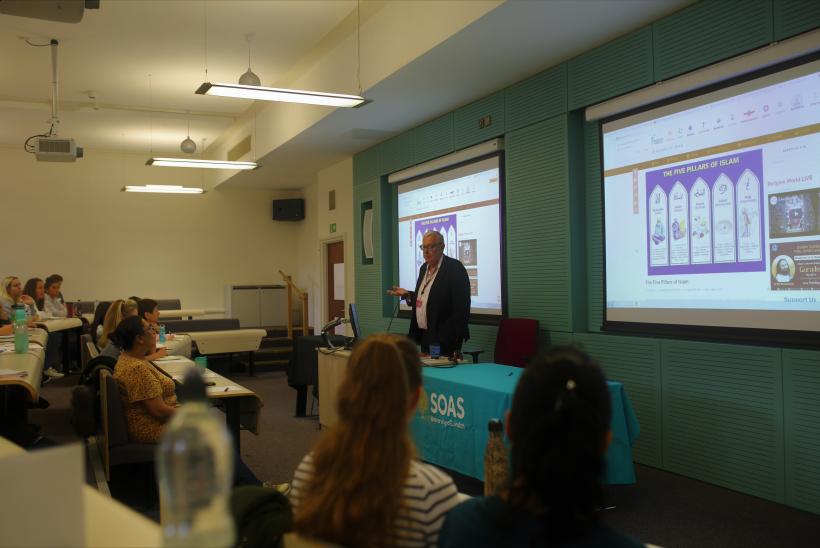GOSH Staff Spend a Day Learning About the Arabian Gulf
At Great Ormond Street Hospital for Children (GOSH), we welcome many families from the Arabian Gulf every year. We always provide our families and patients with the best possible care, including making sure that we are providing culturally appropriate support. To make sure our staff can provide this, we recently partnered with SOAS University of London again, to provide our new staff with a workshop about the Arabian Gulf.
The workshop was run by Jonathon Fryer and Dr Alanoud Al Sharekh. Jonathan Fryer lived in Kuwait for many years, and he is a writer, lecturer and broadcaster on international affairs in the Middle East and North Africa (MENA). Dr Alanoud Al Sharekh is a Kuwaiti native and a country and regional subject expert. She is the director of ‘Ibtikar Strategic Consultancy’, which leads a training programme named ‘Empowering Kuwaiti Women in Politics’.
Our staff gained valuable insights into Arabic culture, history, religion and social aspects and etiquette. In fact, at lunch time they were served with Arabic cuisine with options including (halal) Lebanese meatballs, falafel, tabbouleh, tzatziki, hummus and flatbread.
After working with the Gulf for almost 30 years, Jonathan explained: “I began to realise that not only are there physical differences but huge cultural differences too…It’s very important that there is an exchange of cultural awareness in both directions that staff at GOSH are given some background so that they don’t just see people arriving, dislocated from their own culture and particularly from their religion because Islam is so important to Gulf Arabs.”
He tackled these differences during the workshop, by explaining the history of the Arabian Gulf and the importance of religion. In the Arabian Gulf, “religion forms the heart of society”. And to provide our staff with a better understanding of Islam, he presented on The Five Pillars of Islam and compared it to some Christian traditions as a reference point. In particular Jonathan explained:
- Prayer (Salat): the significance of attending prayer is much like the attendance of the Church during the Victorian times.
- Fasting (Sawm): fasting during Ramadhan is very sacred and important, and therefore may affect the day to day activities of Arab Muslims and their moods. He compared this to the Christian practice of fasting during Lent.
Jonathan further explained that the six Gulf states, who form the Gulf Corporation Council (GCC), are much like the European Union (EU) as they each have proud and separate identities.
Dr Alanoud Al Sharekh – who was named one of the 100 most influential women in the world by the BBC – discussed some of the social aspects of the Arabian Gulf and gave some advice on how to develop awareness and overcome cultural barriers in the hospital. She began by explaining that Gulf nationals are minorities in their own countries, and so they are used to dealing with non-Arabic speakers through the help of Arabic interpreters, especially in a hospital environment. She further touched on the concept of ‘male guardianship’ (wilayah) in contrast to parental responsibility in the UK, which would influence healthcare decisions in the family.
Time management and food as a communal activity are two common features our staff are faced with, while working with patients from the Arabian Gulf. Dr Alanoud shared some valuable information:
- The concept of time was tied with the five different Islamic prayer timings.
- There is both a religious and cultural duty to visit the sick, and bringing food is seen a symbol of respect and love. In the Arabic culture, food is seen as a communal activity and it should be shared – which is why some of our patients share theirs with our staff!
At the workshop our staff learnt about understanding and working with families from the Arabian Gulf, to make their time at GOSH more comfortable. We would like to thank our speakers, SOAS and our Practice Development Team for this important session.


